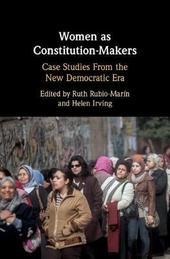
|
Women as Constitution-Makers: Case Studies from the New Democratic Era
Hardback
Main Details
| Title |
Women as Constitution-Makers: Case Studies from the New Democratic Era
|
| Authors and Contributors |
Edited by Ruth Rubio-Marin
|
|
Edited by Helen Irving
|
| Physical Properties |
| Format:Hardback | | Pages:394 | | Dimensions(mm): Height 235,Width 157 |
|
| Category/Genre | Social and political philosophy |
|---|
| ISBN/Barcode |
9781108492775
|
| Classifications | Dewey:342.0082 |
|---|
| Audience | | Professional & Vocational | | Postgraduate, Research & Scholarly | |
|---|
| Illustrations |
Worked examples or Exercises; 1 Tables, black and white
|
|
Publishing Details |
| Publisher |
Cambridge University Press
|
| Imprint |
Cambridge University Press
|
| Publication Date |
28 March 2019 |
| Publication Country |
United Kingdom
|
Description
That a constitution should express the will of 'the people' is a long-standing principle, but the identity of 'the people' has historically been narrow. Women, in particular, were not included. A shift, however, has recently occurred. Women's participation in constitution-making is now recognised as a democratic right. Women's demands to have their voices heard in both the processes of constitution-making and the text of their country's constitution, are gaining recognition. Campaigning for inclusion in their country's constitution-making, women have adopted innovative strategies to express their constitutional aspirations. This collection offers, for the first time, comprehensive case studies of women's campaigns for constitutional equality in nine different countries that have undergone constitutional transformations in the 'participatory era'. Against a richly-contextualised historical and political background, each charts the actions and strategies of women participants, both formal and informal, and records their successes, failures and continuing hopes for constitutional equality.
Author Biography
Ruth Rubio-Marin is Professor of Constitutional Law at the Universidad de Sevilla as well as member of the Faculty of The Hauser Global Law School Program at New York University. She is the director of the Gender and Governance Cluster of the School of Transnational Governance at the European University Institute in Florence. Her research represents an attempt to understand how public law creates categories of inclusion and exclusion around different axes including gender, citizenship, nationality and ethnicity. Her most recent works include Transforming Gender Citizenship: The Irresistible Rise of Gender Quotas in Europe, with Eleonore Lepinard (eds), (2018) and, with Will Kymlicka (eds), Gender Parity and Multicultural Feminism: Towards a New Synthesis (2018). Helen Irving is a Professor of Constitutional Law at the University of Sydney. She holds degrees in political science, anthropology, history, and law. She has held visiting positions at the University of Hong Kong, Harvard University (with the Harvard Chair of Australian Studies), the London School of Economics and Political Science, and the European University Institute, Florence. She is the author and editor of many works on constitutional history, gender and constitutionalism, and constitutional citizenship, including four monographs, the most recent of which is Citizenship, Alienage and the Modern Constitutional State: A Gendered History (Cambridge, 2016). She has served as an expert adviser to national and international agencies, including the National Archives of Australia, the ABC, the International Institute for Democracy and Electoral Assistance, United Nations Development Programme (UNDP), and United Nations Women, and is a Fellow of the Academy of the Social Sciences in Australia, Australian Academy of Law, Royal Society of New South Wales. She was awarded the Australian Centenary Medal in 2003.
|